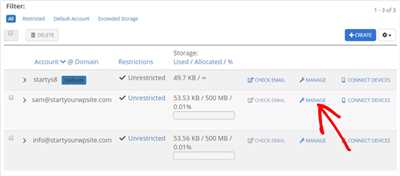
If you have a business, having a professional email address is essential for establishing your online identity. It not only shows that you are a legitimate company, but it also helps in building trust with your customers. In this tutorial, we will guide you through the process of creating a professional business email address with the help of one of the best email service providers – Hostinger.
One of the main reasons why you should have a custom email address is for the purpose of keeping your business and personal emails separate. When you use a personal email account, it can be difficult to organize and manage the emails from different departments or customers. By creating separate email accounts for each department or purpose, you can easily manage and filter your emails.
Here are some of the benefits of having a professional business email address:
1. Trustworthy Look: A professional email address with your own domain name gives your business a more professional and trustworthy look. It enhances your brand image and shows that you take your business seriously.
2. Consistent Branding: Having a custom email address allows you to include your business name in the email, which helps in consistent branding. It creates a positive impression on your customers and increases the chances of them opening and engaging with your emails.
3. Customer Support: When you provide a business email address, it shows that you are committed to providing the best customer support. It gives your customers a direct way to contact you, making it easier for them to communicate any issues or inquiries they may have.
4. Avoiding Spam Filters: Free email services like Gmail or Yahoo are more likely to be filtered as spam compared to a custom business email address. Having your own domain name helps in avoiding such filters and ensures that your important emails reach your customers’ inbox.
5. Brand Image: A professional business email address helps in creating a consistent and professional brand image. It adds credibility to your business and makes it easier for customers to trust and engage with your services.
In this video tutorial, you will learn how to create a professional business email address using Hostinger’s email tools.
- Create Free Business Email Without Domain Free Work Email – 5 Ways
- Frequently Asked Questions
- Video Tutorial: How to Create a Free Business Email Without a Domain
- Business Email Basics
- Why You Should Have a Business Email Address
- Choosing a Provider
- Setting Up Your Business Email Address
- Managing Your Business Email Address
- Avoiding Spam Filters
- Using Email on Different Devices
- Conclusion
- What is a domain
- What is a website
- Why you should use a professional email address for your business
- Creating a professional image
- Keeping a consistent brand identity
- Avoiding spam filters
- Organizing emails by department or purpose
- What are the benefits of a business email address
- How to Create an Email Account FAQ
- How Do I Create a Free Email Account
- Video:
- How to Create a Business Email Account with Gmail for FREE
Create Free Business Email Without Domain Free Work Email – 5 Ways

If you want to create a professional email address for your business but don’t have a domain, you may be wondering if it’s even possible. The good news is that there are several ways to create a free business email without a domain. In this article, we will look at five different methods that you can use to get started with your own business email account.
| Method | Provider | Description |
|---|---|---|
| 1 | Hostinger | If you don’t have your own website or domain, you can create a free business email account with Hostinger. They offer a free email hosting service that allows you to create a custom email address using their domain. This is a great option for small businesses or individuals who want a professional email address without the cost of a domain. |
| 2 | Zoho Mail | Zoho Mail is another popular provider that offers free business email accounts. They provide a range of tools and features, including a custom email domain, multiple email accounts, and a consistent email signature for all users. Zoho Mail is a great option if you want a professional email address without the need for your own domain. |
| 3 | Noviantika | Noviantika is a free email provider that allows you to create a business email account without a domain. They offer a simple and user-friendly interface, along with spam filtering and email management tools. Noviantika is a good choice if you want a free business email account for your organization. |
| 4 | Your Registrar | If you already have a domain registered with a registrar, you can often create a free business email account through them. Many domain registrars offer email hosting services as part of their packages, allowing you to create and manage email accounts using your own domain. This is a good option if you want to maintain a consistent brand identity with your email accounts. |
| 5 | Use Your Own Server | If you have your own server or hosting provider, you can set up your own email accounts using your domain. This gives you complete control over your email accounts and allows you to create custom email addresses for your organization. However, this method requires more technical knowledge and may not be suitable for beginners. |
When choosing a provider for your free business email account, consider the specific features and benefits they offer. Make sure the provider has good customer support and provides spam filtering to help you manage your emails effectively. Also, look for providers that offer tutorials or video guides to help you get started with creating and managing your business email accounts.
By creating a free business email account, you can avoid using generic email accounts like Gmail or Yahoo for your company. A custom email address gives your organization a more professional image and shows that you are serious about your business. It also allows you to separate your personal and work emails effectively.
Frequently Asked Questions
- Why do I want a business email address?
- What are the benefits of creating a free business email account without a domain?
- Can I use my business email address on multiple devices?
- How can I create a consistent email signature for all my business email accounts?
- What should I look for when choosing a provider for my free business email account?
Creating a free business email account without a domain is a great way to get started with managing your work emails professionally. Choose the method that best suits your needs and start creating your own business email accounts today!
Video Tutorial: How to Create a Free Business Email Without a Domain
Are you starting a new business or looking to establish a professional email identity for your organization? Creating a business email address is essential for customer communication and organizing company emails. In this tutorial, we will show you how to create a free business email without a domain.
Why do you need a business email address?
Using a business email instead of a personal email is more professional and helps to establish trust with your customers. It also allows you to separate your personal and professional correspondence, avoiding any confusion. Furthermore, having a business email address adds credibility to your brand and organization.
What are the benefits of creating a free business email without a domain?
There are several reasons why you may want to create a free business email without a domain:
1. It’s cost-effective: You don’t need to purchase a domain or pay for hosting services.
2. Quick and easy setup: You can get started with your professional email address in just a few minutes.
3. Mobile support: Access your business emails seamlessly across different devices.
4. Customization options: Add your logo, create a signature, and choose from different email filters.
5. Professional brand image: A business email address enhances your brand’s identity and professionalism.
How to create a free business email without a domain?
1. Choose an email provider: There are several providers like Zoho, Hostinger, and others that offer free business email services.
2. Visit the provider’s website: Look for their email services page or business email section.
3. Open an account: Provide your details and create an account with the chosen email provider.
4. Get started: Follow the tutorial or step-by-step guide provided by the email provider to set up your business email.
5. Customize your email: Add your brand’s logo, create a signature, and set up filters to organize your emails.
FAQs
1. Can I use my own domain with a free business email? No, since you are creating a free business email without a domain, you will use the email provider’s domain for your email address.
2. Are there any limitations with free business email accounts? Free business email accounts may have limitations on storage space, features, or the number of email accounts you can create. Review the details provided by the email provider.
3. What are the basics of managing a business email account? Managing a business email account includes organizing emails into folders, setting up filters for better email management, and using tools provided by the email provider for a more efficient workflow.
Setting up a free business email without a domain is a great way to get started with your professional email identity. Choose the best email provider for your needs, follow the tutorial or step-by-step guide, and enjoy the benefits of a professional business email address.
Business Email Basics
In today’s digital world, email is one of the most important tools for communication in the business world. Having a professional email address is essential for any company, whether big or small. Here, we will discuss the basics of setting up a business email address and why it is important.
Why You Should Have a Business Email Address
Using a personal email address, such as Gmail or Yahoo, might be convenient, but it does not project a professional image for your business. Having a business email address shows that you are serious about your work and that you have a dedicated space for your professional communication. Moreover, it helps in building trust with your customers and clients.
Choosing a Provider
There are many email service providers available that offer various features and options for business email addresses. Some popular choices include Gmail for Business, Microsoft 365, and Zoho Mail. When choosing a provider, consider factors such as storage space, security features, spam filters, and ease of use on different devices.
Setting Up Your Business Email Address
If you already have a domain for your business, you can use it to create your own custom email address. For example, if your domain is “noviantika.com”, your business email address could be “[email protected]”. You will need to sign up with an email service provider and follow their instructions to set up your business email address.
Managing Your Business Email Address
Once you have your business email address up and running, it is important to manage it effectively. Make sure to regularly check and respond to emails from your clients and customers. Use email organization tools such as folders and filters to keep your inbox organized. Consider using a professional email signature that includes your name, job title, and logo to show a more consistent brand identity.
Avoiding Spam Filters
One challenge of using business email addresses is avoiding spam filters. To ensure that your emails reach your recipients’ inbox, make sure to follow best practices such as including a relevant subject line, avoiding excessive use of links and attachments, and personalizing your emails. It is also a good idea to ask your recipients to add your email address to their trusted contacts or whitelist.
Using Email on Different Devices
In today’s mobile-driven world, it is essential to be able to access your business email on different devices. Your email provider should offer options to access your email from a desktop computer, laptop, smartphone, or tablet. This flexibility allows you to stay connected and respond to important emails even when you are away from your workspace.
Conclusion
In conclusion, having a business email address is a basic requirement for any organization. It helps in establishing a professional image, building trust with customers, and maintaining a consistent brand identity. By following the basics outlined in this tutorial, you can create and manage your own business email address and ensure that your communication is effective and efficient.
What is a domain
A domain is a unique name that identifies a website on the internet. It is like the address of your website or company in the virtual world. When you want to create a company email address, you will need a domain.
Domains are used to establish a consistent and trustworthy online presence for your business or organization. It helps to build your brand image and identity. Having a custom domain gives you a professional and credible appearance, especially when compared to using a free email provider like Gmail or Yahoo.
There are many domain name providers available, but it is important to choose a reliable and trustworthy registrar. Some of the most popular domain name providers include GoDaddy, Namecheap, and Noviantika. These providers will provide you with the necessary tools and support to help you get started.
When choosing a domain name, you should consider the purpose and nature of your business. Your domain name should reflect your brand and be easy for customers to remember and type. It is also important to select a domain extension that is relevant to your industry or organization, such as .com for commercial businesses or .org for non-profit organizations.
In addition to creating a domain, you will also need a hosting server to store your website files and handle email requests. Many domain name providers also offer hosting services, making it easy to set up and manage all aspects of your online presence in one place.
Setting up a company email address with your domain is simple and can be done through email service providers like Zoho or Google Workspace (formerly G Suite). These services will provide you with professional email accounts, allowing you to send and receive emails using your own domain name.
Having a company email address not only helps to maintain a professional image, but it also allows you to organize your emails more effectively. You can create different email accounts for each department or purpose within your organization, avoiding clutter and keeping your workspace more organized.
Additionally, using a company email address with your domain allows you to create a consistent email signature and brand your emails with your logo or other relevant imagery. This adds a personal touch and helps to strengthen your brand identity.
Overall, having a domain for your company email address is essential for any business or organization. It provides you with a professional and trustworthy online identity, helps you establish a good brand image, and enables you to organize and manage your emails more effectively. So, if you want to create a company email address, make sure to get a domain first.
What is a website
A website is a collection of web pages that are interconnected and accessed via the internet. It is a trustworthy platform where businesses and individuals can communicate, share information, and conduct transactions. Websites provide a way for people to access information, products, and services without the need for physical presence or direct interaction.
The purpose of a website can vary depending on the needs and goals of the individual or organization. Some websites are created to showcase products or services, while others serve as online stores or platforms for communication and collaboration. A website can also be used as a tool for creating an online presence and managing the identity of a business or individual.
When it comes to creating a website, there are several essential components to consider. First, you need to choose a domain name, which is the web address that people will use to find your site on the internet. It should be catchy, easy to remember, and relevant to your business or personal brand.
Next, you need to find a web hosting provider, such as Hostinger, to host your website on a server. A hosting provider gives you the space and tools necessary to store your website’s files and make them accessible to internet users. They also provide security measures and technical support to ensure your website is functioning properly.
Once you have a domain name and hosting provider, you can start creating your website. This involves designing the layout, choosing the color scheme, and adding content such as text, images, and videos. It’s important to keep the design and content consistent throughout your website to provide a good user experience.
In addition to the visual aspects, you should also consider the functionality of your website. For example, you may want to include features such as a contact form, an email subscription option, or an online shopping cart. These features can enhance the user experience and provide value to your customers.
Having a professional email address associated with your website is also crucial. It helps to establish trust with your customers and creates a more consistent brand image. Email addresses like “[email protected]” are more likely to be trusted than generic email accounts like “[email protected]”.
There are various email service providers available, such as Zoho Mail, that allow you to create custom email accounts using your domain name. This way, you can have email addresses that match your website and maintain a professional appearance.
Managing your emails effectively is important to avoid spam and keep your inbox organized. Email filters and workspace tools can help you stay organized by automatically categorizing emails and prioritizing important messages.
In conclusion, a website is a powerful tool for businesses and individuals to showcase their products, communicate with customers, and conduct transactions. It provides a platform for establishing an online presence and managing the identity of a business or individual. Creating a website involves choosing a domain name, finding a hosting provider, designing the layout, and adding content and functionality. Having a professional email address associated with your website helps to establish trust with customers and maintain a consistent brand image. Effective email management is also crucial for avoiding spam and keeping your inbox organized.
If you want to learn more about creating a website, check out our tutorial on “How to make a website” for a step-by-step guide.
| FAQ | Answers |
|---|---|
| What is a domain name? | A domain name is the web address that people use to find your website on the internet. |
| Why do I need a hosting provider? | A hosting provider gives you the space and tools necessary to store your website’s files and make them accessible to internet users. |
| How can a professional email address help my business? | A professional email address helps to establish trust with customers and creates a more consistent brand image. |
| What are some good email service providers? | There are various email service providers available, such as Zoho Mail, that allow you to create custom email accounts using your domain name. |
Why you should use a professional email address for your business
When it comes to running a business, choosing a professional email address is crucial. Whether you’re just starting out or have been in the game for a while, having a professional email address adds credibility and trustworthiness to your company’s image.
Using a professional email address that includes your own domain name, such as [email protected], shows that you take your business seriously. It gives the impression that you have invested in your online presence and are committed to providing reliable communication with your customers.
One of the main benefits of having a professional email address is avoiding spam filters. Free email accounts from internet service providers or generic email providers are more likely to be flagged as spam. This can lead to important emails from customers or business partners ending up in the spam folder and going unnoticed.
Another important reason to use a professional email address is the ability to create and manage different email accounts for different departments or employees. This helps in organizing and keeping track of important emails. For example, you can have emails sent to [email protected], [email protected], or even [email protected], making it easier for customers to reach the appropriate department or person.
A professional email address also enables you to have a custom email signature that includes your company logo, website, and contact details. This helps in creating a professional image and showcasing your brand identity in every email you send.
But what do you need to do to get a professional email address? There are various ways to set up a professional email address, but one of the most popular options is using a registrar and hosting provider like Hostinger. They will help you choose and register a domain name that best represents your business, and provide you with the tools to create professional email accounts using your own domain.
If you are looking for a trustworthy email provider, Zoho Workspace is a great option. They offer a free plan that allows you to create up to 5 professional email accounts, along with other useful features and customer support.
In conclusion, using a professional email address for your business has many benefits. It helps in avoiding spam filters, organizing and managing different email accounts, and creating a professional image. Whether you choose to use Hostinger, Zoho Workspace, or any other email provider, setting up a professional email address is an essential step for any business.
Creating a professional image
When it comes to setting up a business email address, it is important to create a professional image for your company. Your email address is one of the most basic ways for customers and employees to communicate with you, so it needs to look trustworthy and consistent with your brand identity.
Firstly, you will need to choose a domain name for your company email address. This is the part of the email address that comes after the “@” symbol, such as “yourcompany.com”. Choosing a custom domain rather than using a generic provider will help to create a more professional image for your business.
Once you have chosen your domain, you can open an account with an email hosting provider. There are many providers available, such as Noviantika, Hostinger, and more, that will allow you to create and manage your company email accounts. Make sure to choose a provider that offers the features and tools you need, such as spam filters and mobile device support.
When creating your email address, it is recommended to use a format that includes your name or the purpose of the email. This will make it easier for others to identify and trust your emails. For example, “[email protected]” or “[email protected]”.
In addition to a professional email address, you should also consider creating a professional email signature. This signature will appear at the bottom of your emails and can include details such as your company logo, contact information, and links to your website or social media accounts. It helps to provide a consistent and professional look to your email communications.
An FAQ section on your website can also help to answer any questions your customers may have about your email address and how to contact you. This will avoid confusion and provide a good support experience for your customers.
Overall, creating a professional image with your company email address is essential for managing your business and building trust with your customers. By following the basics and using the right tools and providers, you can ensure that your email addresses are consistent, professional, and effective for your business needs.
Keeping a consistent brand identity
When creating company email addresses, it is important to consider how they will support your brand identity. A consistent brand identity is key for creating trust and a professional image with your customers. In this tutorial, we will show you the best ways to create email addresses that align with your business and help you avoid spam.
One of the first things to consider is the domain name for your email address. It should be unique, memorable, and reflect the purpose of your business. You can choose to use your own domain name or opt for a custom domain from a provider like Zoho or Hostinger.
Once you have decided on a domain name, you can get started with setting up your email accounts. It is important to choose a provider that offers reliable support and works well with different devices, including mobile. Zoho and Hostinger are two popular providers that offer these features.
When creating email addresses for your employees, you want to include their name or department in the address to make it more personalized. This helps create a sense of ownership and is likely to be more trustworthy to your customers.
To ensure a consistent brand identity, you should also include your business logo or a professional image in the email signature. This will help customers recognize your brand and associate it with the emails they receive from your company.
Another important aspect to consider is the use of email tools and spam filters. These tools can help you avoid spam and ensure that your emails are delivered successfully. They can also provide additional benefits like tracking and analyzing email performance.
Lastly, it is important to educate your employees on the basics of creating a consistent brand identity in their emails. This can include guidelines on tone, language, and formatting to ensure that all communications are in line with your brand values.
In conclusion, creating company email addresses that align with your brand identity is essential for maintaining a professional image and building trust with your customers. By following the best practices outlined in this tutorial, you can create email addresses that reflect the purpose and values of your business.
Avoiding spam filters
When creating company email addresses, it’s important to take steps to avoid spam filters. Spam filters are designed to protect internet users from unwanted and potentially harmful emails. Here are some ways to ensure your company emails are not flagged as spam:
- Use a trustworthy email service provider: Choose a reputable email service provider like Zoho or Hostinger to manage your company email addresses. These providers have built-in spam filters and will help ensure your emails are delivered to recipients without being marked as spam.
- Avoid using free email services: While it may be tempting to use a free email service for your business, such as Gmail or Hotmail, these services are more likely to be flagged as spam. It’s best to use a custom email address that includes your organization’s name.
- Keep your email list clean: Regularly update and verify your email list to ensure you only have valid and engaged recipients. Sending emails to inactive or incorrect addresses can increase the chances of being marked as spam.
- Don’t use misleading subject lines or content: Avoid using deceptive or misleading subject lines and content in your emails. This can trigger spam filters and harm your brand’s reputation.
- Provide an easy way for recipients to unsubscribe: Including an unsubscribe link in your emails gives recipients the option to opt-out from future correspondence. This helps build trust and reduces the likelihood of your emails being marked as spam.
In addition to the above tips, here are a few more details to help you avoid spam filters:
- Use a consistent “From” name and email address: By using the same name and email address for all your outgoing emails, you establish a consistent and recognizable sender identity. This will help your emails bypass spam filters.
- Include your organization’s logo and branding: Adding your company logo and branding to your emails helps establish trust with recipients. It also makes it easier for them to recognize your emails and reduces the chances of them being marked as spam.
- Avoid using excessive images or attachments: Including too many images or attachments in your emails can trigger spam filters. Instead, focus on providing valuable and relevant text content.
- Check your email for spam keywords: Always review your emails before sending them to make sure they don’t contain any spam keywords. There are online tools and services available that can help identify potential spam words.
- Provide clear and helpful email support: Having a dedicated email support department to handle customer inquiries and concerns will help establish your business as trustworthy and legitimate. Make sure to respond promptly and provide helpful answers in your emails.
By following these guidelines, you can increase the chances of your company emails reaching the intended recipients’ inboxes and avoid being flagged as spam.
Organizing emails by department or purpose
When creating a company email address, it is important to consider how you will organize your emails by department or purpose. By doing so, you can ensure that emails are efficiently distributed and easily accessible to the right employees.
One way to organize your emails is to include the department name in the email address. For example, if you have a sales department, you could create email accounts such as [email protected] or [email protected] for general inquiries. This helps to keep emails related to a specific department separate and makes it easier for employees to identify which emails are relevant to them.
Another option is to use a custom email service provider like Zoho or Hostinger. These providers offer tools and services that allow you to create and manage email accounts for your organization. By using these services, you can create department-specific email accounts and access them from various devices, including mobile phones and tablets.
When creating department email accounts, it is important to include basic details like the department name, employee names, and a consistent email signature. This helps to create a professional and cohesive image for your organization. You can also choose to include your company logo in the email signature to further enhance your brand identity.
Organizing emails by department not only helps employees manage their emails more efficiently, but it also helps customers and clients easily find the right department to contact. This can improve customer support and overall customer satisfaction.
To create department-specific email accounts, you will need to choose a domain name and register it with a domain registrar. This will provide you with a unique internet address for your organization. Once you have registered your domain, you can set up email accounts using your domain name.
It is important to avoid creating too many email accounts, as this can become overwhelming to manage. Instead, focus on creating accounts that are necessary for your organization. If you are just getting started, it may be best to open a few key department-specific email accounts and add more as your organization grows.
In addition to organizing emails by department, you may also want to consider organizing emails by purpose. For example, you could create accounts like [email protected] for customer support inquiries or [email protected] for job applications. This helps to categorize emails based on their purpose and makes it easier to respond to them in a timely manner.
Using filters and other tools provided by email services can also help you manage and organize your emails more effectively. These tools allow you to automatically sort incoming emails based on specific criteria, such as sender or subject. This can save you time and help you prioritize important emails.
In conclusion, organizing emails by department or purpose helps to create a more efficient workspace for your employees and provides a better customer experience. By choosing the best email service providers and employing basic organizational strategies, you can manage your company’s emails effectively, ensuring that important messages are easily accessible and responded to in a timely manner.
If you need more details on how to create and manage company email accounts, consult the FAQ section of your chosen email service provider’s website, or seek professional support from IT experts.
What are the benefits of a business email address
Having a professional business email address offers several advantages that can greatly benefit your organization. Here are some key benefits of using a business email address:
1. Professional Image: A business email address with your company’s domain name (e.g., [email protected]) gives your business a more professional image. It shows that you are a legitimate and trustworthy organization.
2. Custom Branding: A business email address allows you to include your company name in the email address, which helps in creating a strong brand identity. It showcases your company to clients and employees, and it gives a more personalized touch to your communication.
3. Better Organization: Business email accounts come with various tools and filters that allow you to efficiently manage and organize your emails. You can set up different folders and filters to automatically sort and prioritize incoming emails, making it easier to find important information when you need it.
4. Avoiding Spam: When using a business email address, you can avoid spam and unwanted emails that are common with personal accounts. Business email providers have advanced spam filters that help protect your inbox from unwanted messages.
5. Mobile Workspace: Business email addresses can be accessed from multiple devices, including smartphones and tablets. This allows you and your employees to access emails and collaborate on the go, increasing productivity and efficiency.
6. Departmental Accounts: Business email addresses can be created for different departments within your organization. This allows for better organization and communication within your company. Employees can have their own professional email addresses that reflect their role and responsibilities.
7. Internet Presence: Having a business email address tied to your website’s domain name helps to establish a strong online presence and enhances your professional credibility.
8. Free Advertisement: When you use a business email address, every email you send becomes a free advertisement for your website. The recipient will see your company’s name with each email, which helps to promote your brand and generate awareness.
9. Increased Trust: Using a business email address instead of a generic email provider like Gmail or Yahoo creates a sense of trust and reliability for your clients and partners. It shows that you are a reputable business and serious about your communication.
10. Data Security: Business email providers offer enhanced security measures to protect your sensitive information. This ensures that your emails and attached files are better protected against unauthorized access.
In conclusion, having a business email address offers numerous advantages, including a more professional image, better organization, avoiding spam, mobile workspace capabilities, departmental accounts, establishing an internet presence, free advertisement, increased trust, and enhanced data security. By using a business email address, you can effectively communicate with clients and partners while showcasing your company’s professionalism and credibility.
How to Create an Email Account FAQ
Q: Why should I create my own email address?
A: Creating your own email address helps you establish a professional brand identity for your business. It also allows you to have more control over your email accounts and the tools you can use to manage and organize them. When you have your own email address, you don’t have to rely on free email services, like Gmail or Yahoo, which may not be as trustworthy or consistent.
Q: How do I create an email account?
A: To create an email account, you will need to choose a domain name and a service provider. You can register a domain name from a domain registrar, where you can also find email hosting services. Many hosting providers, like Hostinger or Zoho, offer tutorials on how to create an email account with their services. Once you have chosen a provider, follow their instructions to set up your account.
Q: What are the benefits of having a custom email address?
A: Having a custom email address gives your business a more professional look and helps build trust with customers. It also allows you to have email addresses specific to different departments or purposes within your company, making it easier to manage and organize your emails.
Q: Can I use my company email address on multiple devices?
A: Yes, you can access your company email on multiple devices, such as your computer, smartphone, or tablet. Most email providers offer mobile apps or webmail interfaces that allow you to access your emails from anywhere.
Q: How can I avoid getting spam emails?
A: To avoid getting spam emails, you can use email filters provided by your email service. These filters can automatically move spam emails to a separate folder or delete them altogether. Additionally, you should avoid sharing your email address publicly, as this can increase the likelihood of receiving spam.
Q: What should I include in my email signature?
A: Your email signature should include your name, job title, company name, contact information, and possibly your company’s logo or a professional image. It helps provide a consistent and professional look to your emails and makes it easier for recipients to contact you.
Q: How can I manage multiple email accounts?
A: Managing multiple email accounts can be done by using email clients or web interfaces that support multiple account management. These tools allow you to view and send emails from different accounts without the need to log in and out of each account separately.
Q: How does an email server work?
A: An email server is a computer program or a system that receives, delivers, and stores emails. When you send an email, your email client communicates with the recipient’s email server to deliver the message. The recipient’s email server then stores the email until the recipient checks their inbox.
Q: Will setting up my own email account cost money?
A: The cost of setting up your own email account will depend on the domain registrar and email service provider you choose. Some offer free email hosting services, while others may charge a fee for their services. It’s important to research and compare different providers to find one that fits your budget and needs.
Q: Do I need a website to have a company email address?
A: No, you don’t need to have a website to have a company email address. However, having a website can provide additional benefits, such as showcasing your products or services and giving your customers more information about your business.
Q: How do I create an email account without a phone number?
A: Some email service providers may require a phone number for verification purposes when creating an email account. However, there are also providers that allow you to create an email account without providing a phone number. It’s best to check with the specific provider for their requirements.
Q: Can I create a company email address with my own domain name?
A: Yes, you can create a company email address with your own domain name. This adds a professional touch to your email address and promotes your brand. By using your own domain, you can also have email addresses specific to your company, such as [email protected] or [email protected].
Q: How can I create a secure email account?
A: To create a secure email account, you should choose a strong, unique password and enable two-factor authentication if available. It’s also important to regularly update your password and be cautious when clicking on links or downloading attachments from unknown sources to avoid phishing scams.
Q: How can I create a company email account for my employees?
A: To create a company email account for your employees, you can choose an email service provider that offers business email hosting. Many providers allow you to create multiple email accounts under your domain, making it easier for your employees to have professional email addresses.
Q: How can email accounts be helpful for keeping my business organized?
A: Email accounts are helpful for keeping your business organized because they allow you to centralize your communication and have a record of your conversations with clients or customers. You can use folders, labels, or tags to categorize and prioritize emails based on their importance or topic.
Q: How do I work with email accounts on my mobile devices?
A: To work with email accounts on your mobile devices, you can use the default email app provided by your device’s operating system or download a third-party email app from your app store. These apps allow you to access and manage your emails on the go.
Q: How should I choose a trustworthy email service provider?
A: When choosing a trustworthy email service provider, you should consider factors such as their reputation, reviews from other users, security measures they have in place, and their customer support. It’s also a good idea to look for providers that have been in the industry for a while and have a good track record.
How Do I Create a Free Email Account
If you want a professional email address for your business or organization, creating a free email account is a good way to get started. There are several ways to create an email account, but in this tutorial, we will focus on how to create an email account using Zoho Workplace.
Zoho is a trustworthy email provider that offers a wide range of features to help you manage your email effectively. With Zoho, you can create custom email addresses that include your domain name, which helps to build your brand and establish a professional identity.
Here are the steps to create a free email account with Zoho:
- Go to the Zoho website and sign up for an account.
- Choose the “Mail” option from the Zoho Workspace to open the email app.
- Create your email address by adding a unique name before the @ symbol.
- Verify your domain by following the instructions provided by Zoho.
- Set up your email account by adding a signature, profile image, and other personal details.
Once your email account is set up, you can start sending and receiving emails. Zoho provides a user-friendly interface that makes it easy to organize your emails, create filters, and manage your inbox effectively.
When choosing an email provider, it is important to consider the benefits they offer. Zoho is one of the best options available since they provide consistent support and reliable server performance. They also have strong spam filters to help you keep your inbox clean.
In addition to Zoho, there are other email providers like Hostinger and Noviantika that offer free email accounts with similar features. However, Zoho is widely considered to be one of the best options for business email accounts.
By creating a free email account for your business, you are likely to gain more trust from your customers and employees. Having a professional email address shows that you are serious about your work and helps to establish your brand.
In conclusion, creating a free email account is a simple process that can be done using various email providers. Zoho is a top choice for business email accounts due to its reliable performance, strong customer support, and user-friendly interface. So, if you want to get started with a professional email address, sign up with Zoho or explore other options mentioned here.
FAQ:
– Why should I choose Zoho for my email account?
Zoho is a trustworthy email provider that offers reliable server performance, strong spam filters, and consistent support, making it one of the best options for business email accounts.
– How can I manage my emails on mobile devices?
Zoho provides a mobile app that allows you to access and manage your emails on your mobile devices. You can download the app from the app store corresponding to your device’s operating system.
– What are the benefits of having a custom email address?
A custom email address helps to establish a professional identity for your business or organization. It also provides better control over your emails and helps to build trust with your customers and employees.
– Can I create multiple email accounts for different departments in my organization?
Yes, with Zoho and other email providers, you can create multiple email accounts for different departments or roles within your organization. This allows for better organization and avoids cluttering the same email address with multiple types of communication.
– Do I need a website to create a free email account?
No, you don’t need a website to create a free email account. Email providers like Zoho, Hostinger, and Noviantika allow you to create a standalone email account without the need for a website.
– Is there a video tutorial on how to create a free email account?
Yes, many email providers provide video tutorials on how to create a free email account. You can find these tutorials on their websites or video sharing platforms like YouTube.









